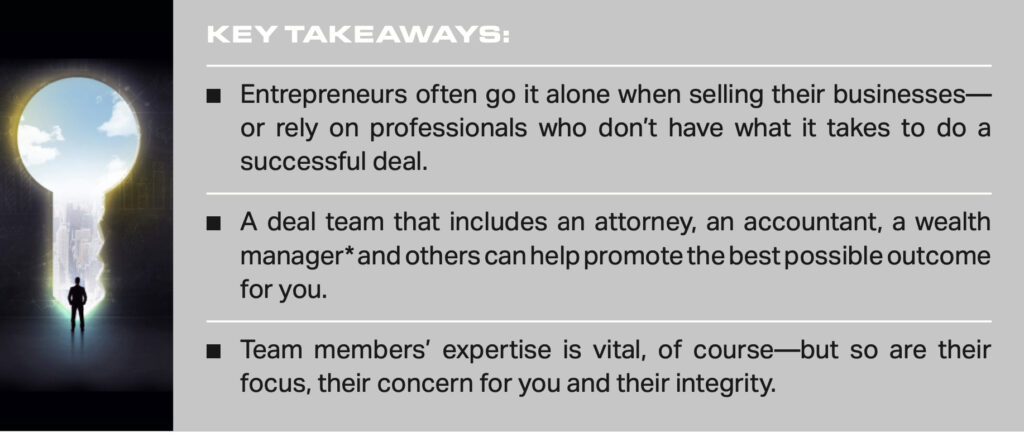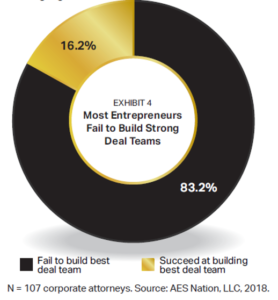Posted on: August 1st, 2019

We see it far too many times: entrepreneurs who spend their lives building extremely successful companies, only to leave significant sums of money on the table when they decide to move on and sell their businesses.
Why? Typically, it’s because the entrepreneurs take on too much of the sales process themselves and don’t enlist the professionals who can help them maximize the amount of wealth they walk away with.
Don’t make that mistake. If you’re planning to sell your company—soon or at some point down the road—you can benefit greatly by assembling a “deal dream team” of experts who can potentially deliver the best outcome possible.
Here’s what that deal team should look like—and how to build and manage it to achieve maximum impact on the sale of your business.
It’s easy to understand why entrepreneurs might be wary of hiring a team when they go to sell their companies. After all, their success has often been driven by themselves—their actions, their decisions and their relationships. Bringing in “outsiders” for a sale can feel uncomfortable and unnecessary.
But think of it this way: You’ve worked for years, probably decades, to build tremendous value in your firm. Now, you’ve got one shot to monetize that value. A moment like that is no time to revisit your “chief cook and bottlewasher” days.
And yet, the vast majority of corporate mergers and acquisitions attorneys we surveyed told us that many entrepreneurs fail to build a deal team that will maximize their success (see Exhibit 4). Consequently, many business owners are likely missing out—getting less for their companies than they probably could—because of a less-than-exceptional deal team.

Getting your deal team right will meaningfully increase the probability of getting the deal done. Conversely, a poorly functioning deal team can lead to a lower price for your company or even no sale at all.
The following types of professionals should be among the people you consider for your deal team:
Important: A wealth manager and a tax professional should also be considered as extended members of the team (see Exhibit 5). It can be a big jump going from a largely illiquid financial situation (with all assets tied up in a business) to suddenly having a sizable amount of liquid assets, post-sale. These professionals can be instrumental in helping former business owners manage their newly realized wealth—taking advantage of financial opportunities, addressing financial challenges, mitigating taxes and so on.
Taking a more comprehensive approach to selling your company by involving a wealth manager can potentially mean you and your family end up personally wealthier than you would otherwise.

Even entrepreneurs who do assemble teams and delegate duties during the sale process often make a decision that can prove very costly to them: using a team of people they have long worked with, rather than finding new professionals with the requisite experience and expertise in selling businesses.
Loyalty is an admirable trait, of course. But that doesn’t automatically mean your current accountant who is excellent at tax compliance is well-suited for the tasks involved in selling your business. Likewise, your longtime attorney may be highly competent in many areas. But is he or she an expert in mergers and acquisitions?
The upshot: If the professionals you choose to be part of your deal team lack the necessary experience and skills, you are the one who will likely feel the negative impact the most. You probably won’t make as much on the sale of your company as you could have, and your post-sale wealth may not be positioned optimally.
There are four key traits to look for in any deal team member you’re considering working with:
If you’re a business owner who is approaching the sale of your business and you already have highly capable talent lined up to help you, congratulations! You may very well be set up for success.
Contact your financial professional to discuss any issues or concerns you might have around selling your company or preparing to sell it down the road.
This report was prepared by, and is reprinted with permission from, VFO Inner Circle. AES Nation, LLC is the creator and publisher of VFO Inner Circle reports.
Disclosure: The opinions expressed in this commentary are those of the author and may not necessarily reflect those held by Kestra IS or Kestra AS. The material is for informational purposes only. It represents an assessment of the market environment at a specific point in time and is not intended to be a forecast of future events, or a guarantee of future results. It is not guaranteed by Kestra IS or Kestra AS for accuracy, does not purport to be complete and is not intended to be used as a primary basis for investment decisions. It should also not be construed as advice meeting the particular investment needs of any investor. Neither the information presented nor any opinion expressed constitutes a solicitation for the purchase or sale of any security. Securities offered through Kestra Investment Services, LLC (Kestra IS), member FINRA/SIPC. Investment advisory services offered through Kestra Advisory Services, LLC (Kestra AS), an affiliate of Kestra IS.
Fusion Wealth Management is not affiliated with Kestra IS or Kestra AS. https://www.kestrafinancial.com/disclosures
VFO Inner Circle Special Report
By Russ Alan Prince and John J. Bowen Jr.
© Copyright 2021 by AES Nation, LLC. All rights reserved.
No part of this publication may be reproduced or retransmitted in any form or by any means, includ- ing, but not limited to, electronic, mechanical, photocopying, recording or any information storage retrieval system, without the prior written permission of the publisher. Unauthorized copying may subject violators to criminal penalties as well as liabilities for substantial monetary damages up to $100,000 per infringement, costs and attorneys’ fees.
This publication should not be utilized as a substitute for professional advice in specific situations. If legal, medical, accounting, financial, consulting, coaching or other professional advice is required, the services of the appropriate professional should be sought. Neither the authors nor the publisher may be held liable in any way for any interpretation or use of the information in this publication.
The authors will make recommendations for solutions for you to explore that are not our own. Any recommendation is always based on the authors’ research and experience.
The information contained herein is accurate to the best of the publisher’s and authors’ knowledge; however, the publisher and authors can accept no responsibility for the accuracy or completeness of such information or for loss or damage caused by any use thereof.
Unless otherwise noted, the source for all data cited regarding financial advisors in this report is CEG Worldwide, LLC. The source for all data cited regarding business owners and other professionals is AES Nation, LLC.